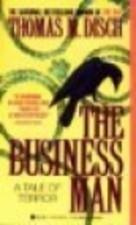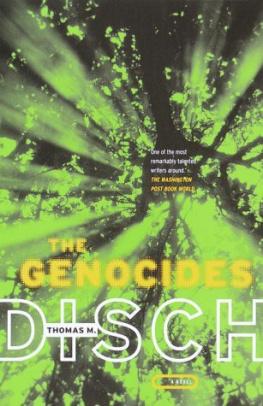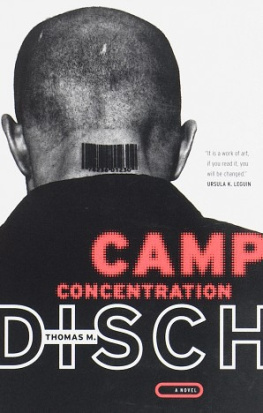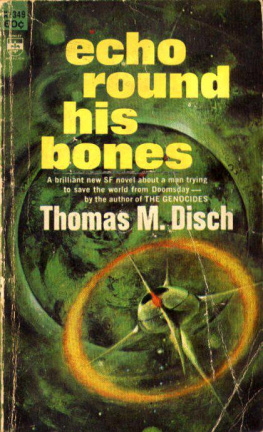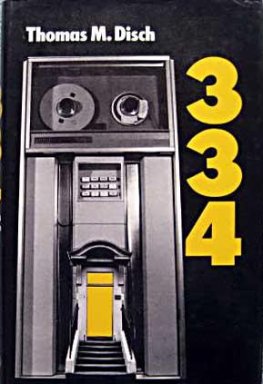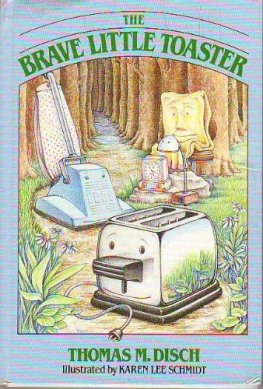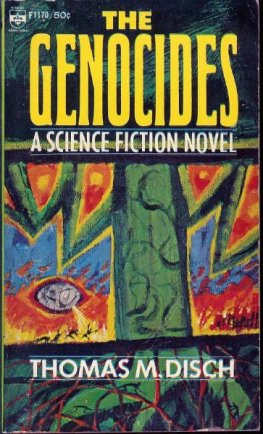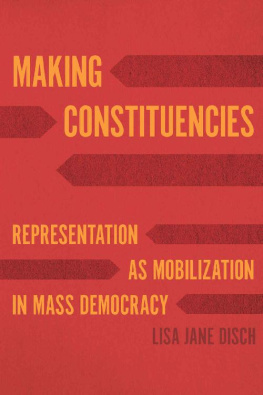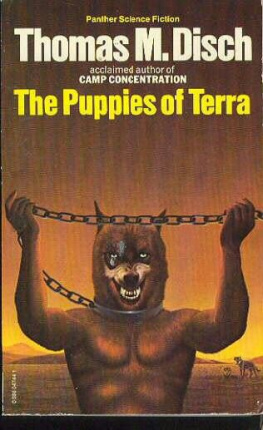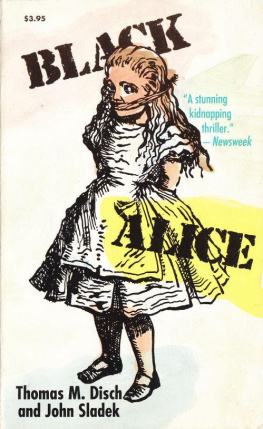Thomas M. Disch - The Businessman
Here you can read online Thomas M. Disch - The Businessman full text of the book (entire story) in english for free. Download pdf and epub, get meaning, cover and reviews about this ebook. year: 1993, publisher: Berkley, genre: Detective and thriller. Description of the work, (preface) as well as reviews are available. Best literature library LitArk.com created for fans of good reading and offers a wide selection of genres:
Romance novel
Science fiction
Adventure
Detective
Science
History
Home and family
Prose
Art
Politics
Computer
Non-fiction
Religion
Business
Children
Humor
Choose a favorite category and find really read worthwhile books. Enjoy immersion in the world of imagination, feel the emotions of the characters or learn something new for yourself, make an fascinating discovery.
- Book:The Businessman
- Author:
- Publisher:Berkley
- Genre:
- Year:1993
- Rating:5 / 5
- Favourites:Add to favourites
- Your mark:
- 100
- 1
- 2
- 3
- 4
- 5
The Businessman: summary, description and annotation
We offer to read an annotation, description, summary or preface (depends on what the author of the book "The Businessman" wrote himself). If you haven't found the necessary information about the book — write in the comments, we will try to find it.
The Businessman — read online for free the complete book (whole text) full work
Below is the text of the book, divided by pages. System saving the place of the last page read, allows you to conveniently read the book "The Businessman" online for free, without having to search again every time where you left off. Put a bookmark, and you can go to the page where you finished reading at any time.
Font size:
Interval:
Bookmark:
THE BUSINESSMAN
Thomas M. Disch
Murdering your wife might not sound all that difficult, and in the case of Bob Glandier it was dead simple. Agenda: fly to Las Vegas, enter the Lady Luck Motor Lodge, strangle, get back on the plane to Minnesota, and resume life as an upper-echelon executive. What came afterward was not so simple.
Still in the grave when the novel opens, and none too pleased, Bob's wife Giselle can foresee that she will be obliged to haunt him. There isn't much else to think about in her situation. Quite inadventently Giselle's mother, Joy-Ann, releases her daughter's spirit one day, the only casualty being that she loses her own life in the process.
While Giselle is out discovering how unpleasant it is to haunt her husband, Joy-Ann arrives in Paradise (not to be confused with "Heaven," which is the next stage along and designed along less mortal, more "Looking-into-the-face-of-God" lines). Joy-Ann meets Paradise's coordinator, the famous nineteenth-century actress Adah Menken, who explains the use of "Home Box Office," where events of your own and your relatives' lives can be played in any order. Adah and Joy-Ann can see that they have a lot of intervening to do to sort out the evil that began at the Lady Luck Motor Lodge.
The ghost of poet John Berryman plays a major -- often heroic -- role in this drama, which is just as well because at the time he meets Giselle he has become thoroughly bored with suburban seances (his dislexia making him particularly hopless at Ouija boards). Elaborate hauntings lie ahead for Berryman and Giselle, transmogrifications and, above all, a battle agains the force which will turn a white Scottish terrier and a heron into killers -- not to mention a rather engaging little boy who will soon be known as "Charlie Manson writ small."
How a novel can at once be so lighthearted and so utterly terrifying is something only Thomas M. Disch can answer. _The Businessman_ is like _The Exorcist_ in a playful mood. The living, the dead and the indeterminate form a cast of characters who interact in a fashion that is disarmingly logical. "Who would have thought that the afterlife had so many rules?" asks Berryman. Many murders and unspeakable horrors later, it seems oddly clear that terms could never have been struck with the businessman any other way.
Thomas Michael Disch became a freelance writer in 1964 after working in advertising. He was born in Iowa in 1940 and educated at New York University. He now has a long list of books to his credit -- poetry, children's books, short story collections, and such notable novels as _334_, _Camp Concentration_, _Clara Reeve_, _On Wings of Song_, and _Neighboring Lives_, which he coauthored with Charles Naylor. He lives in New York City.
Grateful acknowledgment is made for permission to reprint:
Excerpt from "The Assault on Immortality Begins" from _Henry's Fate_ by John Berryman. Copyright 1969 by John Berryman. Copyright 1975, 1976, 1977 by Kate Berryman. Reprinted by permission of Farrar, Straus and Giroux, Inc.
THE BUSINESSMAN. Copyright 1984 by Thomas M. Disch. All rights reserved. Printed in the United States of America. No part of this book may be used or reproduced in any manner whatsoever without written permission except in the case of brief quotations embodied in critical articles and reviews. For information address Harper & Row, Publishers, Inc., 10 East 53rd Street, New York, N.Y. 10022. Published simultaneously in Canada by Fitzhenry & Whiteside Limited, Toronto.
ISBN 0-06-015292-3
FIRST EDITION
The issue always and at bottom is spiritual.
-- DWIGHT D. EISENHOWER
CHAPTER
When she awoke she did not realize for some time where she was. Then it sank in -- she was dead and buried in a grave. How she knew this, by what sense informed, she could not tell. Not by the sight of her eyes, or by any spiritual analog of sight, for how can there be sight where no light enters? Nor was there any tingle of fleshy consciousness in limbs or loins, in heart or mouth. Her body was here in the coffin _with_ her, and in some way she was still linked to its disintegrating proteins, but it wasn't through her body's senses she knew these things. There was only this suspended sphere of self-awareness beyond which she could discern certain dim essentials of the earth immuring her -- a dense, moist, intricated mass pierced with constellations of forward-inching hungers, nodules of intensity against a milky radiance of calm bacterial transformation.
_The worms crawl in_ -- she remembered the rhyme from childhood. _The worms crawl out. The worms play pinochle on your snout_.
How long would this go on? The question framed itself coolly, without triggering alarms. Ghosts -- such ghosts as she had ever heard of -- were supposed to be free to range where they would. Were said to flit. Whereas she remained attached, by some sort of psychic gravity, to this inert carcass, in which even the process of decay was impeded by the chemicals that had been pumped into it.
Almost as the question was formed, the answer existed within her sphere of sentience. Her thinking self would go on thinking... indefinitely. Not "forever." Forever remained as unfathomable and foggy an idea as it had been when she was alive. She knew, too, that she would not always be confined to her corpse's coffin, that a time would come when she'd be able to slip loose from the clinging raiment of flesh to flit at liberty like other ghosts.
But that time was not now. Now she was dead, and she had that to think about.
CHAPTER
On Tuesdays on his lunch hour Glandier drove to The Bicentennial Sauna on Lake Street and got his ashes hauled by whoever was available. He wasn't choosy. The important thing was to get back to his desk by two o'clock. Not that anyone would have cared if he'd been half an hour late. But _he_ cared. He liked to parcel his time into neat whole-hour bundles, a habit he'd carried over from school, where the bells demarcating the hours also signaled a shift of mental gears.
He did, naturally, have his favorites. For a blow job he liked Libby, who was the youngest girl at the sauna and sort of thin and frail. She never got down on her knees in front of him without a little wince of disgust. This had such an immediate positive effect on Glandier that he'd scarcely got his cock down her throat before he'd shot his load. In some ways that seemed a waste of $25, but while it lasted it was great, and for the next ten or fifteen minutes too. Also, it left more time for lunch.
His other favorite must have been the oldest of the lot. Sacajawea she was known as among the clientele of the Bicentennial. A real squaw with a fat ass and big sagging tits and lots of makeup around her eyes. She had a way of drooping her eyelashes down and lifting them up that was sexy as hell though probably just as phony as the lashes. He liked the idea of her having to act like she thought his performance was really hot shit, the way when he was screwing her she'd croon encouraging obscenities, or gasp them if he'd reached that rate of delivery; the way he knew she was grateful for his regular patronage and $5 tips, she being nothing to look at; the way, after he'd got his breath back, she'd start sucking him off again, gratis. Not to much purpose, usually. He could get it up again; that wasn't the problem. But usually he couldn't shoot his load a second time in the forty-five minutes he allotted himself.
The weekly visit to the Bicentennial was a substitute for his former weekly visit to the downtown St. Paul office of Dr. Helbron, a psychiatrist who specialized in combating the depressions and anxieties of upper-echelon executives at 3-M, Honeywell, and other Twin Cities -- based multinational corporations. Dr. Heibron had suggested the Bicentennial himself, claiming that all Glandier needed to start feeling like his old self was a little pussy on a regular basis. How could he refuse the experiment with his own doctor promoting the idea?
Next pageFont size:
Interval:
Bookmark:
Similar books «The Businessman»
Look at similar books to The Businessman. We have selected literature similar in name and meaning in the hope of providing readers with more options to find new, interesting, not yet read works.
Discussion, reviews of the book The Businessman and just readers' own opinions. Leave your comments, write what you think about the work, its meaning or the main characters. Specify what exactly you liked and what you didn't like, and why you think so.

